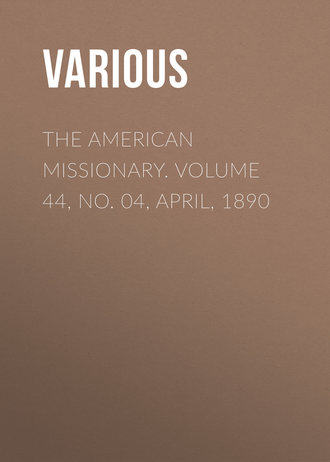 полная версия
полная версияThe American Missionary. Volume 44, No. 04, April, 1890
The question is not, what are you going to do with the colored man, but what are you going to do for him? A great deal has been done, and it has been said that more has been done for the Negroes than for any other people. That is true: and the Negro has done more in these last twenty-five years than any other people on whom money and time and labor has been expended. The American Missionary Association found out long ago what the Negro problem was. They established schools and sent teachers among us, and when they came to us, they came at once, assuming—not as Senator Eustis has done, that the Negroes have an inherent sense of inferiority, and that they should take an assigned place; not as Governor Lee has insisted, that the all-important thing for the white man to do is to keep the Negro down; and not as Senator Gibbs of Georgia, who a few weeks ago insisted that the white people are in imminent peril, and even went so far as to bring a bill before the Legislature as to whether the Negroes should be driven out of that State. That is not the way these teachers have come down to us. They have assumed that we are as capable as other people, that we have the same needs; and because they have come to us with this assumption to begin with, because they have received us in this way, we have made the progress that we have.
Now, of all things that are most needed to be done for us, we need a good theological seminary in the South, where the ministry can be educated among us. It is only an elevated Christian citizenship that will save us, and make us what other people are; and we must have a theological seminary to aid us toward that end. You have given us colleges, normal schools, industrial training schools, and schools of common branches, and we have now young men and young women filling all the schools through the South. We can get good teachers for our schools in the remotest places, in Arkansas, Texas and Mississippi, or anywhere else. So it is not a question as to what kind of teachers we will have. But the churches have not in their pulpits ministers well prepared to preach the gospel of Christ. They have not kept up with the young people in the work done by the schools. In the North, one of the pleasant things we find wherever we go, is that in all your churches there is something for the young people to do. You have Christian Endeavor Societies, and various organizations by which the young people may be reached. Therefore, you gather them in from the beginning and have them trained so that they can take your places as soon as you are ready to step out of the work. It is not so with our churches. Our ministers have not advanced to that degree where they can take up such work. In these little Congregational churches that have been planted, we have educated ministers, who are able thus to work, especially among young people. We do not have people at our hand as other churches have, but we are trying to get hold of them. In Fisk University there were last year, I believe, 510 students, of whom, perhaps, there were 100 Congregationalists. So, after all, it is Methodists and Baptists that you are educating there. This is all right, because the great masses of the people are found in those churches. If we had a Congregational Theological School we could reach these people just as well through the pulpit as we reach them in the schools.
I was asked to give a little of my personal experience. I dislike to do this: but if narrating any of my personal experience will give an insight into the work that the American Missionary Association is doing, I will gladly consent. My story is the story of hundreds of young men in the South. Only in the larger cities can we get a good English education, except we go to schools established for us by this Association. I went eight years to Fisk University. I have a brother there now in the senior college class. This is his tenth year, and I have a sister who is also in her tenth year there. It takes a long while to get through. My father had no money to send me to school. In his slavery days he had stolen a little bit of learning, and had learned how to write and read and a little arithmetic. I was about four years old when the stroke for freedom was made. My father began to teach me arithmetic, and many a day in his shoemaker's shop, as I sat and kept the fire going, he would teach me and carry me as far as he could; and he put into me the idea of getting an education. At fifteen he told me I might have my own time. At that age I had advanced far enough to pass the examination of the district school, and, having passed, I made my way to Fisk University. I had not known that there was such an institution in the land, or such a thing as the Missionary Association; but going once into an adjoining county, I happened to fall in with some Christian young men from Fisk, and they told me about that school. I had always had a great desire to be educated, and so I went down there. When I arrived there, I thought it was a strange place. I was familiar with white people, but I think I had never up to that time had one of them shake hands with me. When I found what they were doing there, and that it was an earnest Christian school, my whole soul was uplifted, and I determined to seek for better things. I thought I was pretty well educated, but when I found myself down stairs among those learning grammar and arithmetic, and that there were nine years before me, I concluded that after all I was not very well educated, but I set out to go through that long course of study.
During all those years of study I taught school every summer. For nine years I was not out of the school room a month in the year. I was either a pupil or a teacher. Wherever I was teaching, I would try to set up a little Fisk University of my own. You know that the school teacher who goes out into these country places is everybody and everything. He is law and gospel, and he must know everything—at least, he must not let people know that he does not know everything. So I was not only school teacher, but I organized a Sunday-school, and preached, also. Especially in Mississippi I did that kind of work, where there was much need of it. This is the way that hundreds of young men have gone through Fisk University and other institutions. We get our education sometimes at great cost, and at great hardships. Sometimes we break down under this constant strain of teaching. Many a time in Mississippi swamps I have waded up to my knees in water going to school, and many a time have I taught lying sick on my back; but the money had to be made. This is the way we get through, and not only the young men but the girls. There are two things which it teaches us: It teaches us how to be men, and it teaches us how to work. We are forced to do it for the money's sake, and it is not only for the money's sake, because we are sure that these young men and young ladies go out with a Christian desire to do good, and a young man, whether he is a Christian or not, feels that he must do Christian work when he is teaching in the summer. He is hardly respectable if he does not do that sort of thing during his service as a teacher. In that way the great masses of the people are being reached by Christian students going out among them.
So it seems to me as though the problem were being slowly yet truly solved, and by and by the Negroes will be lifted up on the same footing with other people. That is the only thing we want. We are not fighting for social equality, or this or that thing. No intelligent Negro has any desire to put the South into the hands of the Negroes for rule. No man who is intelligent could wish the government of the South to come into the hands of any ignorant and inexperienced people, whether white or black, and that is what we are as a mass. But we do want recognition, so far as we have those qualities that would cause the same thing to be granted to us if we were not Negroes. This is the only thing that we ask for, and this is what is withheld from us. There are those even in the South who are willing to give us this recognition, and little by little they are getting over some of their prejudice and are inclined to recognize us so far as we have a right to their respect. Of course there are those who are determined to keep the Negro down; but these are coming over slowly but surely, and by and by there will be in this land no Negro problem.
Bureau Of Woman's Work
Miss D.E. Emerson, Secretary.
In our February number, in mentioning the special work of some of the Woman's Organizations, we referred to the four teachers of the Woman's Home Missionary Association. These have been assigned them from the ranks of the American Missionary Association additional to their former work in the Southern field. They having transferred to the American Missionary Association their former work, have now eleven missionaries under our auspices.
We also failed to mention in our February number the Woman's Union of Iowa, which is rendering us so substantial aid in the support of our Beach Institute at Savannah, Georgia.
And here comes yet another pledge—the Union of Kansas starting in with three hundred dollars toward the support of a missionary. Nebraska has also come forward with a pledge of a definite amount.
The State Unions organized in the South have begun their growth in the right direction. The Union of Louisiana shows its right to live by the following words from its Treasurer: "I have just had the privilege of sending off three postal orders, $8.00 to the A.M.A., $7.00 to the A.H.M.S., and $3.00 to the W.B.M.I., which at least is a beginning. We hope the little acorn planted last April may yet be a grand live oak."
The following from one of the auxiliaries of the Union of Tennessee and Kentucky is also cheering. "The inclosed $6.00 is an offering of our Ladies' Missionary Society of Trinity Congregational Church to the American Missionary Association, the first fruits, financially, of the little organization. Be assured the small gift is accompanied with large-hearted gratitude for the work of the Association in elevating the colored people, and earnest prayers for the continued success of the Association in its beneficent work in every field."
MICHIGAN,—"We have we think, a model Missionary Society in our church. We take up the study of our six great Societies and give two months to each, just preceding our church collection for the same cause. We study them as thoroughly as possible and our collections for the two months go to the object of our study. November and December are A.M.A. months with us. At our meeting this week we had reports from the Chicago meeting. We always aim to have at least one leaflet to put into each family once a month—on the study we are on—hoping in this way to gain the attention of those not interested."
A Novel Dish
A barrel of clothing recently sent from Putney and Dummerston, Vermont, received its first installment of gifts from a Christmas plum pudding, which formed a part of the Christmas exercises. A wash-tub was covered with brown paper to represent a pudding. At the proper time a young man dressed to represent a cook, with white cap and apron, and wand of office, entered the room followed by two boys, also in white caps and aprons, and carrying a pudding dish. Placing this in the center of the platform, the chief cook advanced to the front, and after appropriate words of greeting and of explanation, the assistants passed down the aisles and gathered the various ingredients, or "plums" which the audience had brought. When ready it was started on its way to the South. We venture to say it will last longer and do more good than any plum pudding that ever was served.
Our Many-sided Missionary Work
One of our efficient ladies, Principal of a large school embracing the grades from primary to the high school and normal department, and in which the scholastic standard is creditably maintained, writes as follows:
"Our school is on the whole in good condition. The teachers are earnest, efficient and united. The students are of a better average than ever before. There has been a healthful religious interest all the year. During the past two weeks there have been several conversions in every room, (unless, perhaps, in the primary). Every room has had some religious services conducted by the teachers. A few union services were held, attended by those interested. These were mostly conducted by Miss B. In Miss S.'s room the conversions are very hopeful young men and women.
"The industrial classes of boys and girls were never so large before, and among the girls the spirit of real work and helpfulness through work seems to be developing true womanly character. In the tool-room there are five classes of from eight to fourteen boys every day. A little printing-press is set up, and one boy has begun to set type. The shop is a busy place when fourteen boys are in it shoving their saws and planes, running the lathes, carving or hammering, and they usually seem very happy. We are looking with anxious longing for that new teacher promised. The number of country students this year makes it imperative if we reach these surrounding counties, as we want to do, but the new teacher must come soon, or we must send away thirty-five or forty scholars, nearly all from the country. This is written that you 'also might know our affairs and how we do.'"
Woman's State Organizations
Co-operating With The American Missionary AssociationMAINE.
WOMAN'S AID TO A.M.A.
Chairman of Committee—Mrs. C.A. Woodbury, Woodfords, Me.
VERMONT.
WOMAN'S HOME MISSIONARY UNION.
President—Mrs. A.B. Swift, 167 King St., Burlington.
Secretary—Mrs. E.C. Osgood, 14 First Ave., Montpelier.
Treasurer—Mrs. Wm. P. Fairbanks, St. Johnsbury.
MASSACHUSETTS AND RHODE ISLAND.
1WOMAN'S HOME MISSIONARY ASSOCIATION.
President—Mrs. Alice Freeman Palmer, Cambridge, Mass.
Secretary—Miss Nathalie Lord, 32 Congregational House, Boston.
Treasurer—Miss Ella A. Leland, 32 Congregational House, Boston.
CONNECTICUT.
WOMAN'S HOME MISSIONARY UNION.
President—Mrs. Francis B. Cooley, Hartford.
Secretary—Mrs. S.M. Hotchkiss, 171 Capitol Ave., Hartford.
Treasurer—Mrs. W.W. Jacobs, 19 Spring St., Hartford.
NEW YORK.
WOMAN'S HOME MISSIONARY UNION.
President—Mrs. Wm. Kincaid, 483 Greene Ave., Brooklyn.
Secretary—Mrs. Wm. Spalding, 6 Salmon Block, Syracuse.
Treasurer—Mrs. L.H. Cobb, 59 Bible House, New York City.
OHIO
WOMAN'S HOME MISSIONARY UNION.
President—Mrs. J.G.W. Cowles, 417 Sibley St., Cleveland.
Secretary—Mrs. Flora K. Regal, Oberlin.
Treasurer—Mrs. F.L. Fairchild, Box 932, Mt. Vernon, Ohio.
INDIANA.
WOMAN'S HOME MISSIONARY UNION.
President—Mrs. C.B. Safford, Elkhart.
Secretary—Mrs. W.E. Mossman, Fort Wayne.
Treasurer—Mrs. C. Evans, Indianapolis.
ILLINOIS.
WOMAN'S HOME MISSIONARY UNION.
President—Mrs. B.F. Leavitt, 409 Orchard St., Chicago.
Secretary—Mrs. C.H. Taintor, 151 Washington St., Chicago.
Treasurer—Mrs. C.E. Maltby, Champaign.
IOWA.
WOMAN'S HOME MISSIONARY UNION.
President—Mrs. T.O. Douglass, Grinnell.
Secretary—Miss Ella E. Marsh, Box 232, Grinnell.
Treasurer—Mrs. M.J. Nichoson, 1513 Main St., Dubuque.
MICHIGAN.
WOMAN'S HOME MISSIONARY UNION.
President—Mrs. George M. Lane, 47 Miami Ave., Detroit.
Secretary—Mrs. Leroy Warren, Lansing.
Treasurer—Mrs. E.F. Grabill, Greenville.
WISCONSIN.
WOMAN'S HOME MISSIONARY UNION.
President—Mrs. H.A. Miner, Madison.
Secretary—Mrs. C. Matter, Brodhead.
Treasurer—Mrs. C.C. Kealer, Beloit.
MINNESOTA.
WOMAN'S HOME MISSIONARY SOCIETY.
President—Mrs. E.S. Williams, Box 464, Minneapolis.
Secretary—Miss Gertude A. Keith, 1350, Nicollet Ave., Minneapolis.
Treasurer—Mrs. M.W. Skinner, Northfield.
NORTH DAKOTA.
WOMAN'S HOME MISSIONARY SOCIETY.
President—Mrs. A.J. Pike, Dwight.
Secretary—Mrs. Silas Daggett, Harwood.
Treasurer—Mrs. J.M. Fisner, Fargo.
SOUTH DAKOTA.
WOMAN'S HOME MISSIONARY UNION.
President—Mrs. A.H. Robbins, Bowdie.
Secretary—Mrs. T.M. Jeffris, Huron.
Treasurer—Mrs. S.E. Fifield, Lake Preston.
NEBRASKA.
WOMAN'S HOME MISSIONARY UNION.
President—Mrs. T.H. Leavitt, 1216 H. St., Lincoln.
Secretary—Mrs. L.F. Berry, 724 No. Broad St., Fremont.
Treasurer—Mrs. D.E. Perry, Crete.
MISSOURI.
WOMAN'S HOME MISSIONARY UNION.
President—Mrs. C.L. Goodell, 3006 Pine St., St. Louis.
Secretary—Mrs. E.P. Bronson, 3100 Chestnut St. St. Louis.
Treasurer—Mrs. A.E. Cook, 4145 Bell Ave., St. Louis.
KANSAS.
WOMAN'S HOME MISSIONARY SOCIETY.
Presidents—Mrs. F.J. Storrs, Topeka.
Secretary—Mrs. George L. Epps, Topeka.
Treasurer—Mrs. J.G. Dougherty, Ottawa.
COLORADO AND WYOMING.
WOMAN'S HOME MISSIONARY UNION.
President—Mrs. J.W. Pickett, White Water, Colorado.
Secretary—Miss Mary L. Martin, 106 Platte Ave., Colorado Springs, Colorado.
Treasurer—Mrs. S.A. Sawyer, Boulder, Colorado.
Treasurer—Mrs. W.L. Whipple, Cheyenne, Wyoming.
SOUTHERN CALIFORNIA.
WOMAN'S HOME MISSIONARY UNION.
President—Mrs. Elijah Cash, 927 Temple St., Los Angeles.
Secretary—Mrs. H.K.W. Bent, Box 426, Pasadena
Treasurer—Mrs. H.W. Mills, So. Olive St., Los Angeles.
CALIFORNIA.
WOMAN'S HOME MISSIONARY SOCIETY.
President—Mrs. H.L. Merritt, 686 34th St., Oakland.
Secretary—Miss Grace E. Barnard, 677 21st St., Oakland.
Treasurer—Mrs. J.M. Havens, 1389 Harrison St., Oakland.
LOUISIANA.
WOMAN'S MISSIONARY UNION.
President—Mrs. R.C. Hitchcock, New Orleans.
Secretary—Miss Jennie Fyfe, 490 Canal St., New Orleans.
Treasurer—Mrs. C.S. Shattuck, Hammond.
MISSISSIPPI.
WOMAN'S MISSIONARY UNION.
President—Mrs. A.F. Waiting, Tougaloo.
Secretary—Miss Sarah J. Humphrey, Tougaloo.
Treasurer—Miss S.L. Emerson, Tougaloo.
ALABAMA.
WOMAN'S MISSIONARY UNION.
President—Mrs. H.W. Andrews, Talladega.
Secretary—Miss S.S. Evans, 2612 Fifth Ave., Birmingham.
Treasurer—Mrs. E.J. Penney, Selma.
FLORIDA.
WOMAN'S HOME MISSIONARY UNION.
President—Mrs. S.F. Gale, Jacksonville.
Secretary—Mrs. Nathan Barrows, Winter Park.
Treasurer—Mrs. L.C. Partridge, Longwood.
TENNESSEE AND ARKANSAS.
WOMAN'S MISSIONARY UNION OF THE CENTRAL SOUTH ASSOCIATION.
President—Miss M.F. Wells, Athens, Ala.
Secretary—Miss A.M. Cahill, Nashville, Tenn.
Treasurer—Mrs. G.S. Pope, Grand View, Tenn.
NORTH CAROLINA.
WOMAN'S MISSIONARY UNION.
President—Miss E. Plimpton, Chapel Hill.
Secretary—Miss A.E. Farrington, Raleigh.
Treasurer—Miss Lovey Mayo, Raleigh.
We would suggest to all ladies connected with the auxiliaries of State Missionary Unions, that funds for the American Missionary Association be sent to us through the treasurers of the Union. Care, however, should be taken to designate the money as for the American Missionary Association, since undesignated funds will not reach us.
Receipts For February, 1890
The Daniel Hand Fund,
For the Education of Colored People.
From Mr. Daniel Hand, Guilford, Conn.
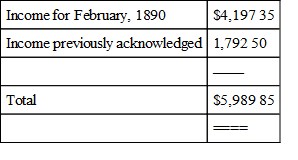
Current Receipts
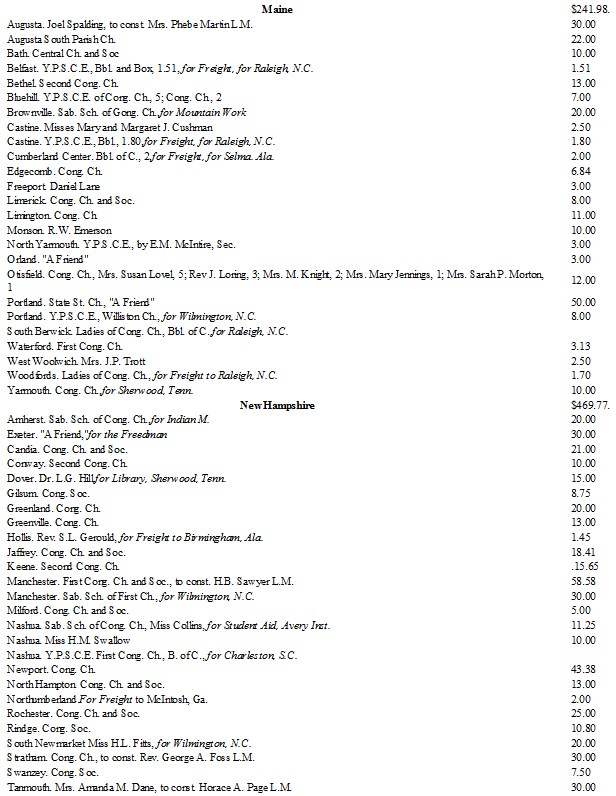
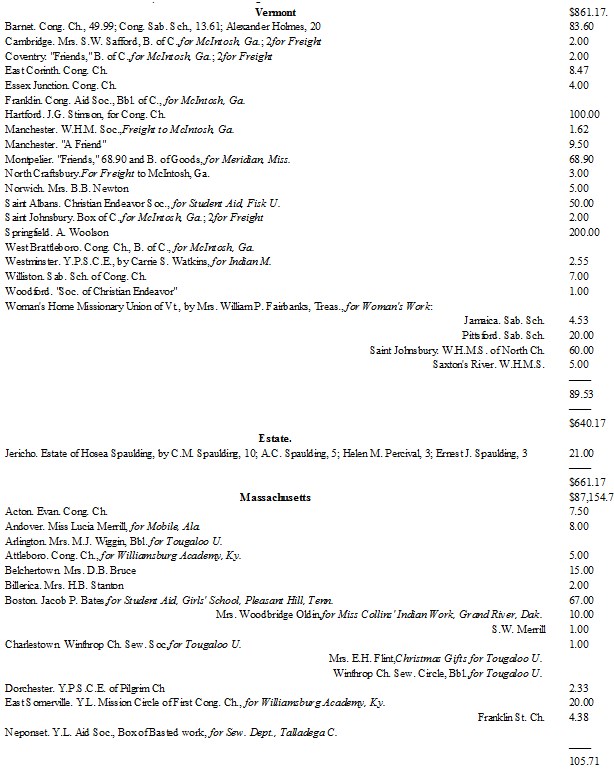
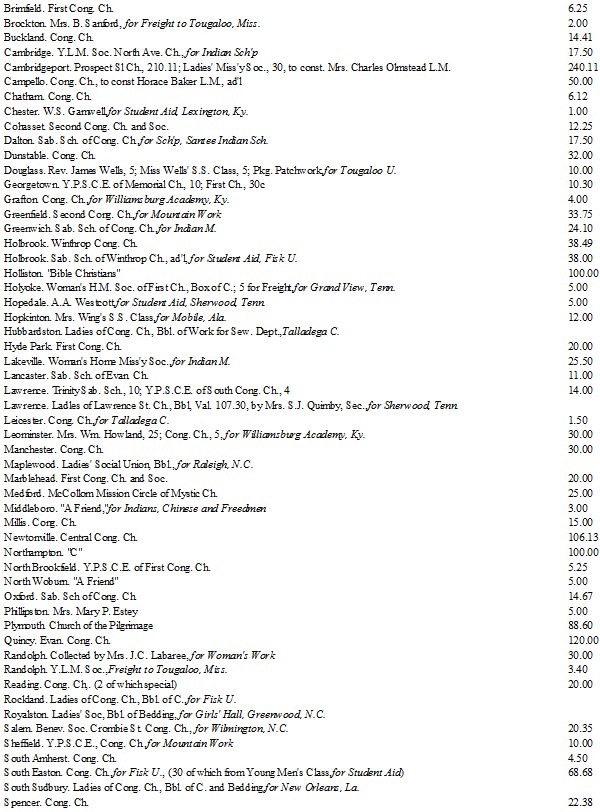
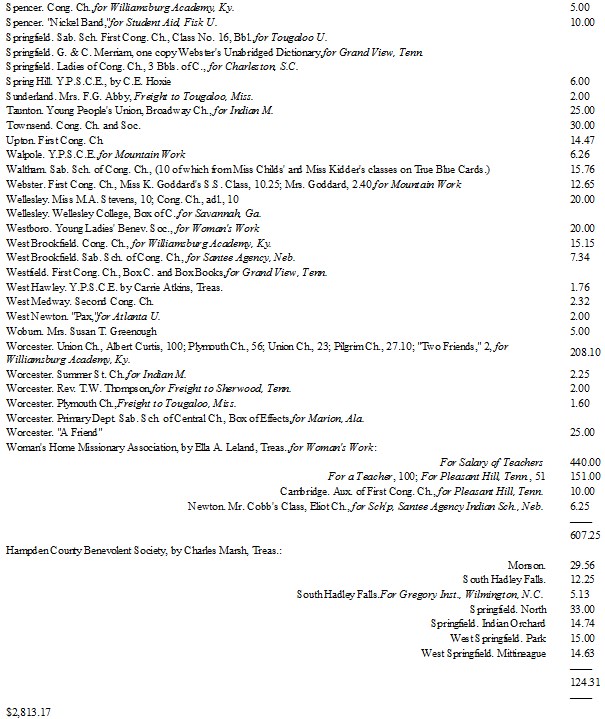
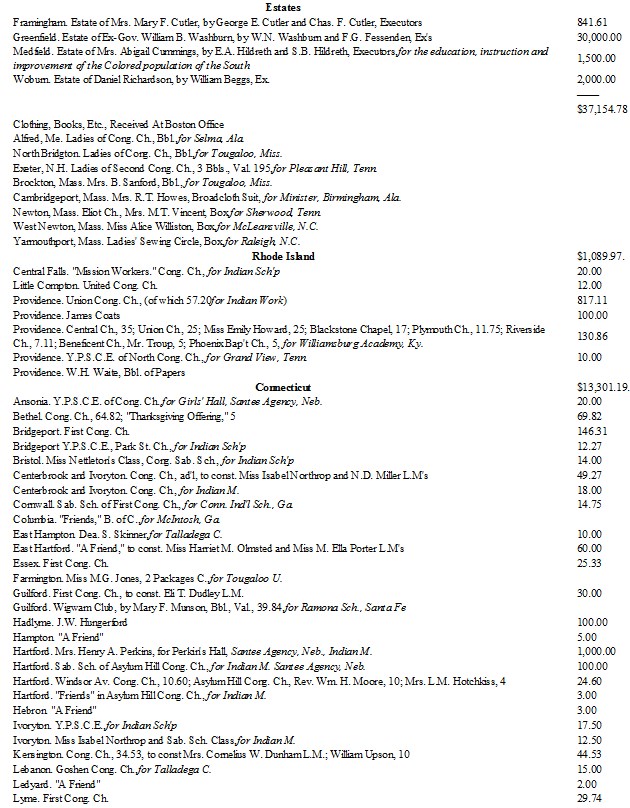
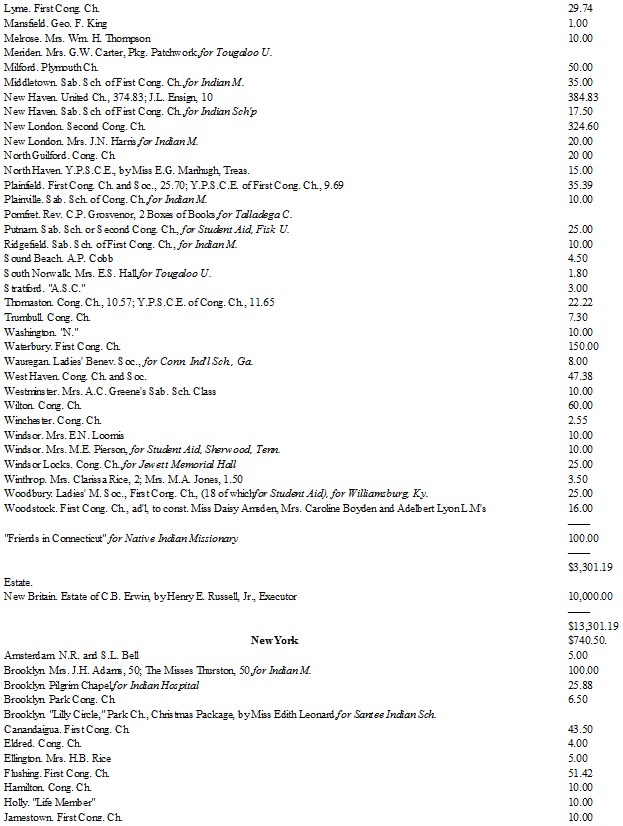
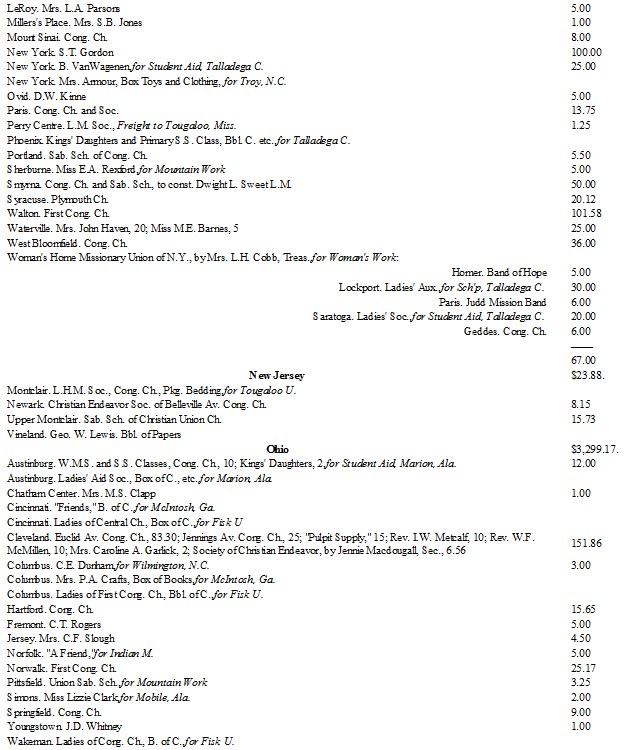
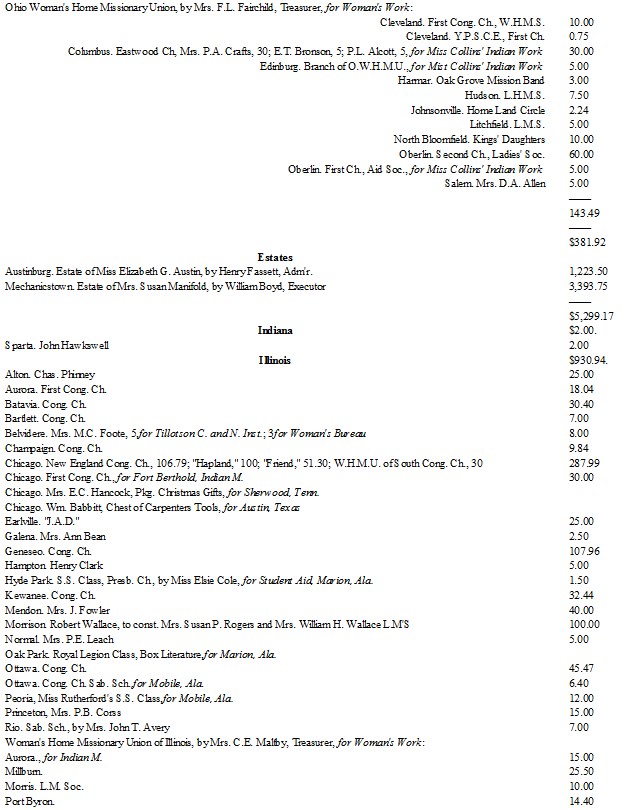
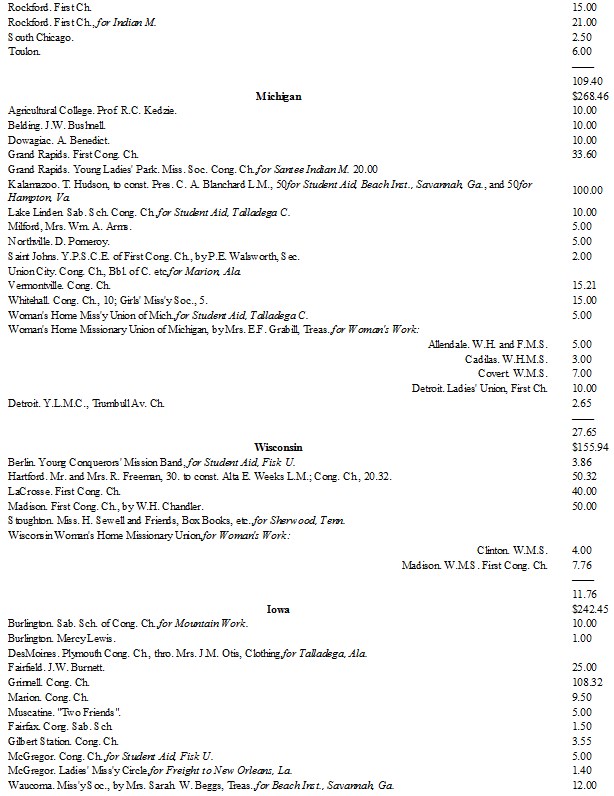
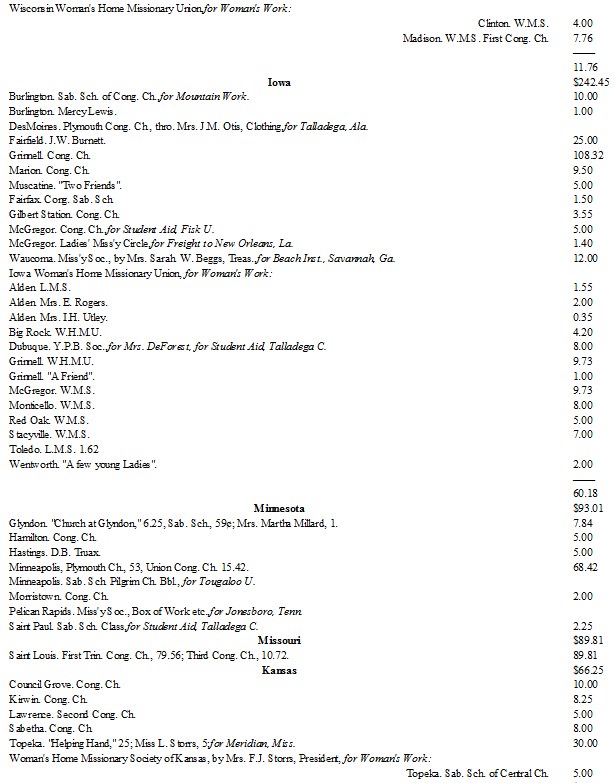

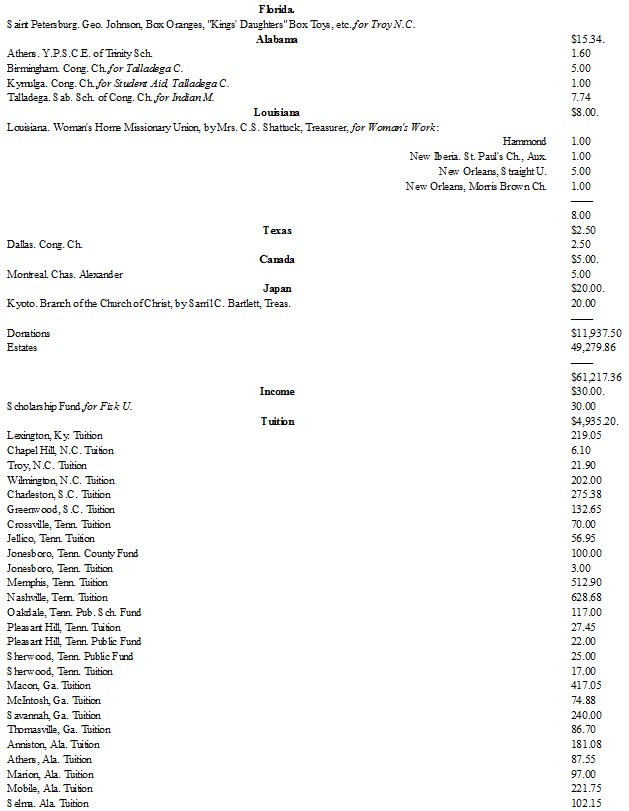
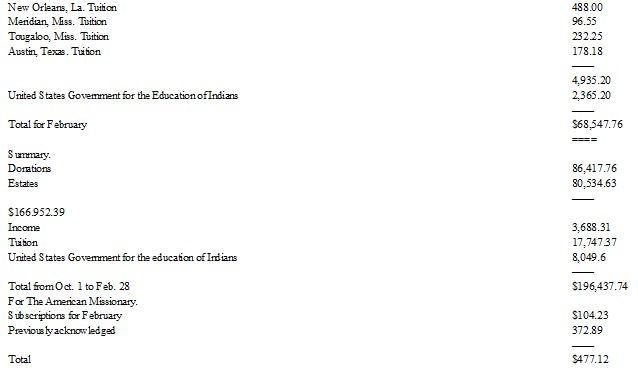
1
For the purpose of exact information, we note that while the W.H.M.A. appears in this list as a State body for Mass, and R.I., it has certain auxiliaries elsewhere.









